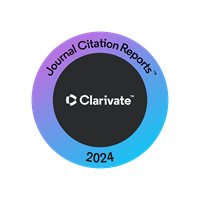Simulating soil carbon and nitrogen trends under an integrated system in the Brazilian Cerrado
Resumo
Management systems that include trees tend to provide higher amounts of plant biomass to the soil, contributing to the increase in carbon (C) and nitrogen (N) stocks. This study simulated C and N stocks and their compartments in a crop-livestock-forest integration system in the edafoclimatic conditions of the Maranhão Cerrado using the Century 4.5 model. The evaluated areas were native Cerrado vegetation (NV) and crop-livestock-forest integration (CLFI). The calibration process gradually modified the model parameters to better fit the simulated and observed soil C and N stocks. The best fit between the data was obtained after changes in the main parameters (DEC3(2), DEC4, and DEC5) that controlled the rate of decomposition of soil organic matter. C and N stocks increased by 14% and 15%, respectively, over 14 years after replacing NV with CLFI. The slow compartment of C presented greater sensitivity to changes in management, with an increase of 47% compared with that of NV. The active compartment increased by 31% and the passive compartment remained constant for over 14 years. Future scenarios, where pasture was maintained between the eucalyptus trees and the scenario that allowed the soybean, corn, and Brachiaria rotation between the trees, were more effective, accumulating approximately 37 Mg C ha-1. The continuous contribution of residues from the trees and pasture increased C and N stocks in the long-term in the slow fraction, where the total organic carbon increased from 32 to 36 Mg ha-1 when NV was replaced with CLFI. The model predicted the C and N stocks with accuracies ranging from 1 to 11% of the observed values
Downloads
Referências
Althoff, T. D., Menezes, R. S. C., Pinto, A. S., Pareyn, F. G. C., Carvalho, A. L., Martins, J. C. R., … Sampaio, E. V. S. B. (2018). Adaptation of the century model to simulate C and N dynamics of Caatinga dry forest before and after deforestation. Agriculture, Ecosystems and Environment, 254, 26-34. DOI: https://doi.org/10.1016/j.agee.2017.11.016
Bertomeu, M. (2012). Growth and yield of maize and timber trees in smallholder agroforestry systems in Claveria, northern Mindanao, Philippines. Agroforestry Systems, 84, 73-87. DOI: https://doi.org/10.1007/s10457-011-9444-x
Bremner, J. M. (1996). Total Nitrogen. In D. L. Sparks (Ed.), Methods of soil analysis: Part 3 (p. 1085-1121). Madison, WI: SSA Book Series.
Calil, F. N., Lima, N. L., Silva, R. T., Moraes, M. D. A., Barbosa, P. V. G., Lima, P. A. F., … Nascimento, A. R. (2019). Biomass and nutrition stock of grassland and accumulated litter in a silvopastoral system with Cerrado species. African Journal of Agricultural Research, 11(38), 3701-3709. DOI: https://doi.org/10.5897/AJAR2016.11369
Cecagno, D., Gomes, M. V., Costa, S. E. V. G. A., Martins, A. P., Denardin, L. G. O., Bayer, C., … Carvalho, P. C. F. (2018). Soil organic carbon in an integrated crop-livestock system under different grazing intensities. Revista Brasileira de Ciências Agrárias, 13(3), 1-7. DOI: https://doi.org/10.5039/agraria.v13i3a5553
Cerri, C. E., Easter, M., Paustian, K., Killian, K., Coleman, K., Bernoux, M., … Cerri, C. C. (2007). Simulating SOC changes in 11 land use change chronosequences from the Brazilian Amazon with RothC and Century models. Agriculture, Ecosystems and Environment, 122(1), 46-57. DOI: https://doi.org/10.1016/j.agee.2007.01.007
Conceição, M. C. G., Matos, E. S., Bidone, E. D., Rodrigues, R. A. R., & Cordeiro, R. C. (2017). Changes in soil carbon stocks under integrated crop-livestock-forest system in the Brazilian Amazon region. Agricultural Science, 8(9), 904-913. DOI: https://doi.org/10.4236/as.2017.89066
Ellert, B. H., & Bettany, J. R. (1995). Calculation of organic matter and nutrients stored in soils under contrasting management regimes. Canadian Journal of Soil Science, 75(4), 529-538. DOI: https://doi.org/10.4141/cjss95-075
Instituto Nacional de Meteorologia [INMET]. (2021). Dados climáticos. Retrieved on Dec. 10, 2021 from http://www.inmet.gov.br/portal/Andgt
Isernhagen, E. C. C., Rodrigues, R. A. R., Diel, D., Matos, E. S., & Conceição, M. C. G. (2017). Estoques de carbono lábil e total em solo sob integração lavoura-pecuária-floresta na região de transição Cerrado/Amazônia. Nativa, 5(7), 515-521. DOI: https://doi.org/10.5935/2318-7670.v05nespa09
Jacomine, P. K. T., Cavalcanti, A. C., Pessôa, S. C. P., Burgos, N., Medeiros, L. A. R., Lopes, O. F., & Mélo Filho, H. F. R. (1986). Levantamento exploratório-reconhecimento de solos do Estado do Maranhão (1. ed.). Rio de Janeiro, RJ: Embrapa-SNLCS/Sudene-DRN.
Leite, L. F. C., Mendonça, E. S., Machado, P. L. O. A., Fernandes Filho, E. I. F., & Neves, J. C. L. (2004). Simulating trends in soil organic carbon of an Acrisol under notillage and disc plow systems using the Century model. Geoderma, 120(3-4), 283-295. DOI: https://doi.org/10.1016/j.geoderma.2003.09.010
Ministério da Agricultura, Pecuária e Abastecimento [MAPA]. (2012). Plano Setorial de Mitigação e de Adaptação às Mudanças Climáticas para a Consolidação de uma Economia de Baixa Emissão de Carbono na Agricultura: Plano ABC (Agricultura de Baixa Emissão de Carbono). Ministério da Agricultura, Pecuária e Abastecimento, Ministério do Desenvolvimento Agrário, Coordenação da Casa Civil da Presidência da República. Brasília, DF: MAPA.
Mendes, M. M. S., Lacerda, C. F., Cavalcante, A. C. R., Fernandes, F. É. P., & Oliveira, T. S. (2013). Desenvolvimento do milho sob influência de árvores de pau-branco em sistema agrossilvipastoril. Pesquisa Agropecuária Brasileira, 48(10), 1342-1350. DOI: https://doi.org/10.1590/S0100-204X2013001000005
Metherall, A. K., Harding, C. V., Cole, C. V., & Parton, W. J. (1993). Century soil organic matter model environment. Technical documentation agroecosystems version 4.0. Great Plains System Research Report 4. Usda-Ars. Fort Collins, CO: Colorado State University.
Moreira, E. D. S., Gontijo Neto, M. M., Lana, Â. M. Q., Borghi, E., Santos, C. A., Alvarenga, R. C., & Viana, M. C. M. (2018). Production efficiency and agronomic attributes of corn in an integrated crop-livestock-forestry system. Pesquisa Agropecuária Brasileira, 53(4), 419-426. DOI: https://doi.org/10.1590/S0100-204X2018000400003
Oelbermann, M., Echarte, L., Marroquin, L., Morgan, S., Regehr, A., Vachon, K. E., & Wilton, M. (2017). Estimating soil carbon dynamics in intercrop and sole crop agroecosystems using the Century model. Journal of Plant Nutrition and Soil Science, 180(2), 241-251. DOI: https://doi.org/10.1002/jpln.201600578
Oelbermann, M., & Voroney, R. P. (2011). An evaluation of the Century model to predict soil organic carbon: examples from Costa Rica and Canada. Agroforestry Systems, 82, 37-50. DOI: https://doi.org/10.1007/s10457-010-9351-6
Parton, W. J., Schimel, D. S., Cole, C. V., & Ojima, D. S. (1987). Analysis of factors controlling soil organic matter levels in great plains grasslands. Soil Science Society of America Journal, 51(5), 1173-1179. DOI: https://doi.org/10.2136/sssaj1987.03615995005100050015x
Salton, J. C., Mielniczuk, J., Bayer, C., Fabrício, A. C., Macedo, M. C. M., & Broch, D. L. (2011). Teor e dinâmica do carbono no solo em sistemas de Integração lavoura-pecuária. Pesquisa Agropecuária Brasileira, 46(10), 1349-1356. DOI: https://doi.org/10.1590/S0100-204X2011001000031
Silva Junior, C. H. L., Anderson, L. O., Aragão, L. E. O. C., & Rodrigues, B. D. (2018). Dinâmica das queimadas no Cerrado do Estado do Maranhão, Nordeste do Brasil. Revista do Departamento de Geografia, 35, 1-14. DOI: https://doi.org/10.11606/rdg.v35i0.142407
Sommer, R., Paul, B. K., Mukalama, J., & Kihara, J. (2018). Reducing losses but failing to sequester carbon in soils – the case of Conservation Agriculture and Integrated Soil Fertility Management in the humid tropical agro-ecosystem of Western Kenya. Agriculture, Ecosystems and Environment, 254, 82-91. DOI: https://doi.org/10.1016/j.agee.2017.11.004
Teixeira, P. C., Donagemma, G. K., Fontana, A., & Teixeira, W. G. (2017). Manual de métodos de análise de solo (3. ed.). Rio de Janeiro, RJ: Embrapa Solos.
Tsukamoto Filho, A. D. A., Couto, L., Neves, J. C. L., Passos, C. A. M., & Silva, M. L. (2004). Fixação de carbono em um sistema agrissilvipastoril com eucalipto na região do cerrado de Minas Gerais. Agrossilvicultura, 1(1), 29-41.
Weber, M. A., Mielniczuk, J., & Tornquist, C. G. (2016). Changes in soil organic carbon and nitrogen stocks in long-term experiments in southern Brazil simulated with Century 4.5. Revista Brasileira de Ciência do Solo, 40, 1-17. DOI: https://doi.org/10.1590/18069657rbcs20151115
Wendling, B., Jucksch, I., Mendonça, E. S., Almeida, R. F., & Alvarenga, R. C. (2014). Simulação dos estoques de carbono e nitrogênio pelo modelo Century em Latossolos, no Cerrado Brasileiro. Revista Ciência Agronômica, 45(2), 238-248. DOI: https://doi.org/10.1590/S1806-66902014000200003
Wink, C., Reinert, D. J., Müller, I., Reichert, J. M., & Jacomet, L. A. (2013). A idade das plantações de Eucalyptus sp. influenciando os estoques de carbono. Ciência Florestal, 23(2), 333-343. DOI: https://doi.org/10.5902/198050989279
Wink, C., Reinert, D. J., Tornquist, C. G., & Silva, I. R. (2015). Dinâmica do carbono e nitrogênio em plantações de eucalipto no Rio Grande do Sul. Revista Brasileira de Ciência do Solo, 39(6), 1623-1632. DOI: https://doi.org/10.1590/01000683rbcs20140182
Yeomans, J. C., & Bremner, J. M. (1988). A rapid and precise method for routine determination of organic carbon in soil. Communications in Soil Science and Plant Analysis, 19(13), 1467-1476. DOI: https://doi.org/10.1080/00103628809368027
DECLARAÇÃO DE ORIGINALIDADE E DIREITOS AUTORAIS
Declaro que o presente artigo é original, não tendo sido submetido à publicação em qualquer outro periódico nacional ou internacional, quer seja em parte ou em sua totalidade.
Os direitos autorais pertencem exclusivamente aos autores. Os direitos de licenciamento utilizados pelo periódico é a licença Creative Commons Attribution 4.0 (CC BY 4.0): são permitidos o compartilhamento (cópia e distribuição do material em qualqer meio ou formato) e adaptação (remix, transformação e criação de material a partir do conteúdo assim licenciado para quaisquer fins, inclusive comerciais.
Recomenda-se a leitura desse link para maiores informações sobre o tema: fornecimento de créditos e referências de forma correta, entre outros detalhes cruciais para uso adequado do material licenciado.





















































